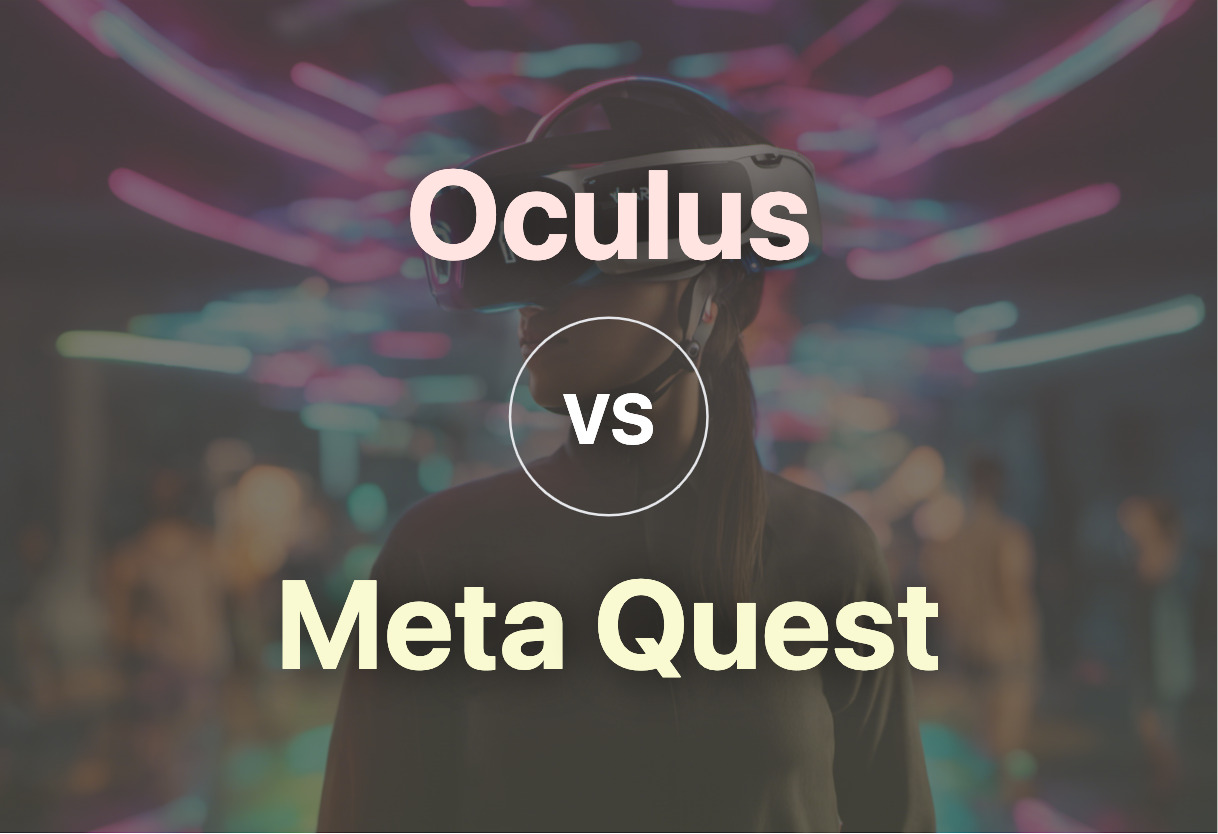Oculus Rift excels as an affordable VR headset offering immersive experiences for non-professional use. However, for creative professionals and developers seeking superior performance and mixed-reality features, Meta Quest with its state-of-the-art Snapdragon XR2 Gen 2 platform and high-resolution passthrough for MR mode is the compelling choice.

Key Differences Between Oculus Rift and Meta Quest
- Founding: Oculus Rift, created by Oculus VR, pioneered mainstream VR. Meta Quest is a more recent product by Meta Platforms Inc.
- Hardware: Oculus Rift requires a connected PC/console whereas Meta Quest is standalone.
- Performance: Meta Quest runs on Snapdragon XR2 Gen+2, offers double processing power, 30% leap in resolution over Oculus Rift.
- MR Capabilities: Meta Quest Pro offers mixed reality mode. Oculus Rift lacks this feature.
- Cost: Oculus Rift is more affordable, while Meta Quest Pro is higher priced, catering to professional users.
| Comparison | Oculus Rift | Meta Quest |
|---|---|---|
| Initial Release | March 2013 | 2018 (as Oculus Quest) |
| Development History | Developed by Oculus VR, founded by Palmer Luckey to revive the VR industry | Product of Meta Platforms Inc (formerly Facebook), evolved from Oculus Quest platform |
| Standout Technologies | Geometric pre-distortion, large stereoscopic field-of-view, three-axis gyros, accelerometers, and magnetometers for absolute head orientation tracking without drift | Standalone VR headset running Qualcomm Snapdragon XR2 Gen 2 platform, 4K+ Infinite Display, 25 pixels per degree, 1,218 pixels per inch, integrated spatial audio, High-fidelity Passthrough for mixed-reality environment |
| Resolution | 1280×800 (DK1), Improved in later versions | 1800×1920 (Quest Pro) |
| Compatibility | Software library still compatible with successor, Oculus Quest | Compatible with Quest 2’s games |
| Latest Model Release and Price | Oculus Rift S (2019), Discontinued in 2021 | Meta Quest Pro (Unspecified), Priced at $999.99 |
| Latest Tech Innovations | Oculus Rift S with improved clarity and reduced screen door effect | Meta Quest Pro with mixed reality capabilities and high-resolution passthrough |
| Alternatives | Samsung Gear VR, HTC VIVE SteamVR headset | None specified |
What Is Oculus Rift and Who’s It For?
A cutting-edge product of technology behemoth Oculus VR, Oculus Rift stands as a beacon and pioneer in the field of VR headsets. Born out of the visionary footsteps of Palmer Luckey, Oculus Rift’s mission encapsulates the reviving spark for the VR industry. This marvel launched in 2013 as the Oculus Rift DK1, bolstering a tech-savvy design and revolutionary features. Oculus Rift caters predominantly to tech-enthusiasts and gamers seeking realistic, mind-bending VR experiences without compromising affordability.

Pros of Oculus Rift
- First affordable VR headset offering both quality and intense immersive experience
- Superior FOV, providing panoramic view unprecedented in VR industry
- Resolution of 1280×800 total, effectively 640×800 per eye
Cons of Oculus Rift
- Screen door effect, however, improved in later versions
- Discontinued in April 2021
- Requires external hardware for operation
What Is Meta Quest and Who’s It For?
In the domain of Virtual Reality, Meta Quest, formerly named Oculus Quest, is the child prodigy of Meta Platforms Inc. Ditching the prerequisite of external hardware, Quest provides an all-inclusive VR experience to its users. Meta Quest 3, an advanced version, further ups the standard by blurring the lines between VR and AR, transforming into a mixed reality headset. Targeted towards both immersive gaming and professional use, Meta Quest serves as a one-stop solution for tech enthusiasts and professionals alike.

Pros of Meta Quest
- No need for external PC or console, an all-encompassing VR experience
- A visual leap with 30% improvement in resolution
- Pro version – offering Mixed Reality capabilities at a professional level
Cons of Meta Quest
- Expensive Pro version priced at $999.99
- Storage options might be insufficient for heavy users
- Pass-through in regular version is black-and-white
Meta Quest vs Oculus Rift: The Final Verdict
After our in-depth analysis, it’s time to decide which VR experience boasts superior capabilities: Meta Quest or Oculus Rift?
Developers & Code Enthusiasts
Considering the rich and dynamic heritage of Oculus Rif, it still forms an essential component of the VR universe, specifically for its profound array of hackability and easy integration. With its extensive software library and absolute head orientation tracking, it’s an optimal choice for developers.

Professional AR/VR Creators
In the arena of the Meta Quest Pro, the device exhibits superior tech capabilities for high-level professional usage. Its AR simulations in real-world environments coupled with extensive storage capabilities and CPU & GPU performance enhancement offer cutting-edge AR/VR crafting experiences.

VR Gaming Enthusiasts
For the gaming cohort, key factors are comfort, audio-visual quality, and playability. Here the Oculus Rift; boons us with unprecedented field-of-view (FOV), reduced screen door effect, and high clarity. Quest claims its stand by delivering 4K+ Infinite Display, enhanced audio quality, and customizable fit, introducing a balance of realism and comfort.

Casual Users
Meta Quest 3 outmuscles Oculus Rift S for casual users due to its standalone capability, eliminating any need for an external PC. Enhanced by its lighter design, it offers an easy, user-friendly introduction to VR for the uninitiated.

Conclusively, “Oculus Rift vs Meta Quest” isn’t a one-sized verdict. From seasoned developers to casual users, your choice depends on your proficiency and the unique VR experience you crave. Yet, here’s a snippet: For cutting-edge, standalone VR experiences with mixed-reality capabilities, lean towards Meta Quest. For dynamic hackability, robust integration, and an accessible price, Oculus Rift holds its ground.
Grant Sullivan
Content writer @ Aircada and self proclaimed board game strategist by day, AI developer by night.





